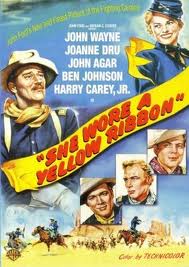
SHE WORE A YELLOW RIBBON
US, 1949, 103 minutes, Colour.
John Wayne, Joanne Dru, Ben Johnson, John Agar, Victor Mc Laglan, Mildred Natwick.
Directed by John Ford.
This western comes second in the so-called trilogy of John Ford's 'Cavalry' films. The first was Fort Apache, 1948, and the third, Rio Grande in 1950. John Wayne is the star of each of these films and had worked altogether with Ford in fourteen films. Also in the cast are quite a number of Fords regular stars. In fact Ben Johnson and Victor Mc Laglan portray the same characters in Rio Grande. This is a sentimental tribute to the Cavalry and its work especially in presenting Wayne (at the age of 42) as an older and retiring Captain. The spirit of the Cavalry in the West is certainly present in its morale, work for the preservation of safety, its dealing with the Indians. This was to continue very strongly in Rio Grande. This film is distinguished by the use of colour and Winton Hoch won an Oscar for this. This film is very typical John Ford material.
1 The appeal of the Western, the Cavalry Western? John Ford's reputation and interests? The quality of his Westerns? The appeal of this style of Western in the forties, now?
2 Audience response to the American Cavalry? Expectations of its role, behaviour? Morale boosting? The way of life of the Cavalry, its work? Its code? This film as a satisfying tribute?
3 The quality of the colour photography, the use of the locations? The presentation of the West with its desert, mountains, skyline? The tableau of the Cavalry moving through the West? The score, the use of rousing Cavalry songs? The score illustrating the spirit of the Cavalry?
4 The narrative and the explanation of the role of the Cavalry? The documentary tone? The presentation of the American West in the era after the Civil War? The overtones of clash between North and South? The emphasis on the United States and the importance of the President? The work of the Cavalry? The Indians and their gathering together in large numbers? The injustices of the white man to the Indian? The clashes?
5 The film as a John Wayne vehicle? His ease at this kind of role, his embodiment of the West? The introduction to Nathan Brittles? His age, looking forward to retiring? The cemetery sequences and his talking to his wife? His background as a Cavalryman? His relation to the men especially Quincannon, Tyree? The two young officers with their rivalry over Oliver? His attitude towards the women at the fort? His reaction to his work, his mission? Hope for success and finishing with dignity and honour? The acquired wisdom of the years? His authoritarian attitudes and sayings especially about apologizing and punishment? His experience of failure in the mission and yet his personal success and care for those under his command? A good leader? His farewell, the presentation? His decision to help in the confrontation with the Indians? His respect for the Indians and meeting them? His final promotion? A look at a Cavalryman with great sentiment and respect?
6 The two young officers and their skills, their rivalry, their learning and stepping into the cavalry tradition? The various authority figures in the fort? The death of the officer at the besieged fort?
7 Quincannon and the broad Irish humour, his manner of talking to Nathan, drinking, the fight in the bar, his going to prison? The humorous aspect of cavalry life?
8 The women at the fort - the tough military wife and her knowing how to deal with situations, the operation during the trek, her care for the children at the fort? Olivia as the tourist from the East, her charm and glamour, her being put down by Nathan - kindly? Her being the cause of the massacre and the delay with the stage-coach meeting? Her learning from experience? The marriage?
9 Tyree as a skilful scout, the sequence of his escape from the Indians, his loyalty to Nathan? His knowing his place and only giving his opinion when asked? The strong tradition of the Indian scouts?
10 The mission and its difficulties, the length of the film given to the journey, the scenes of the trek across the desert? The walking, riding, the operation?
11 The battle sequences? The gathering of the Indians? Their pursuit, shooting? The gun sellers and the ugliness of their deaths and torture - as watched by Nathan and the men? The fort and the people who were killed? Nathan’s visit to the elder Indians? The avoiding of bloodshed? The background of white and Indian relationships?
12 The achievement of the Cavalry as embodied in Nathan? His farewell, his promotion and the joy of his becoming a Leading Scout?
13 This kind of Western as exemplifying the American heritage?